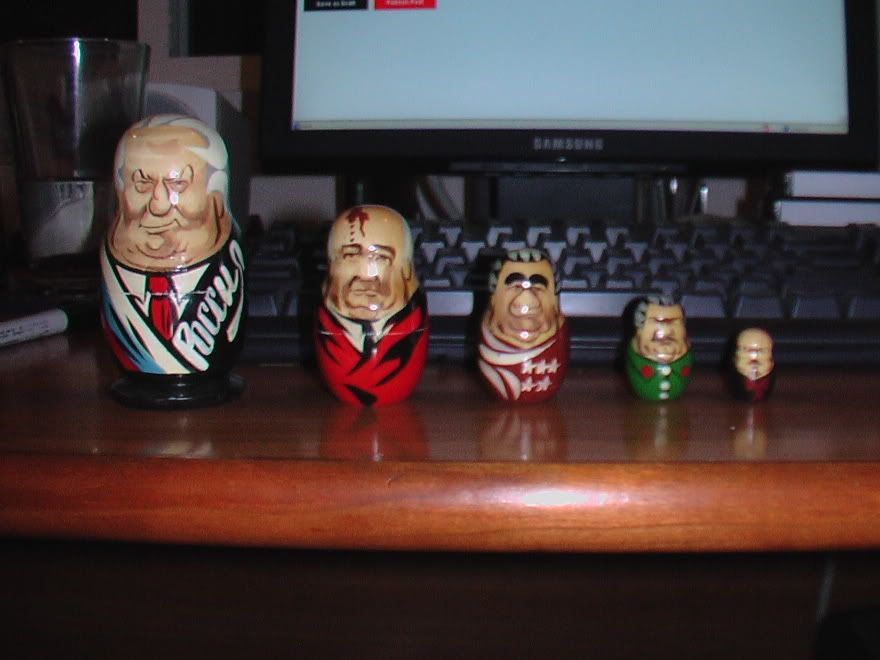Who were the leaders of the Cold War?
 Since the Cold War spanned several decades many leaders came and went. More came and went in the West as these countries democratically elected their leaders and they were subject to term limits. Some of the countries under communism saw even less turnover at the top because they were ruled by dictators. In Yugoslavia Josip Broz Tito ruled from before the end of WWII until his death in 1980. During the Cold War the United States elected nine different Presidents, none serving longer than eight years. The USSR had seven General Secretaries of the Communist Party during the same period. Leonid Brezhnev was in power the longest, 1964 to 1982. The two leaders following Brezhnev had short reigns as they both died or became very ill while in office, paving the way for the younger reform minded Mikhail Gorbachev.
Since the Cold War spanned several decades many leaders came and went. More came and went in the West as these countries democratically elected their leaders and they were subject to term limits. Some of the countries under communism saw even less turnover at the top because they were ruled by dictators. In Yugoslavia Josip Broz Tito ruled from before the end of WWII until his death in 1980. During the Cold War the United States elected nine different Presidents, none serving longer than eight years. The USSR had seven General Secretaries of the Communist Party during the same period. Leonid Brezhnev was in power the longest, 1964 to 1982. The two leaders following Brezhnev had short reigns as they both died or became very ill while in office, paving the way for the younger reform minded Mikhail Gorbachev.Gorbachev in the USSR and Ronald Reagan, President of the US, were very instumental to the Cold War's conclusion. Reagan, a virulent anti-communist, attacked the USSR and it's policies rhetorically from the very outset of his presidency calling it in one speech an "evil empire." He increased defense spending and floated the idea of a nuclear missile "shield" called the Strategic Defense Initiative (SDI) and dubbed "Star Wars" by his critics. SDI caused waves of protest from the Soviet Union, but also from many within the United States. The nuclear doctrine of Mutual Assured Destruction (MAD) had been the centerpiece for keeping the wary peace between the rivals for decades. The idea that no defense against nuclear weapons was best, since both sides understood the devastation that would accompany thermo-nuclear war. Hence the name Mutual Assured Destruction. SDI threatened to upset this precarious balance. With a defense system in place, in theory the US would have the first-strike capability against the USSR without fear of repercussions. For obvious reasons, the Soviets didn't care for this policy, but the fear in the US was that SDI would ratchet up tensions and the Soviets may feel cornered and would launch a strike before the US had the system in place. As it was, SDI was, and probably still is, years if not decades from being a practical reality. But the idea, and Reagan's refusal to take it off the table at a summit with Gorbachev in Iceland, caused the USSR to continue to spend a disproportionate part of their treasury on defense and further contributed to the decline of it's economy. Reagan had even agreed to share the technology with the Soviets, and then both countries would be free to dismantle all of their nuclear weapons.
Despite the rhetoric and hardball tactics, Reagan and Gorbachev connected on a personal level and were able to lead their countries in making the correct decisions that led to a relatively peacful end to the Cold War.
That is a brief snippet of a couple of leaders from the era and a little bit about what made them effective. Maybe this week I'll have time to cover a few more in detail. What little I've read about Kruschev I've found to be pretty interesting and the same goes for Richard Nixon. More is probably known about the mistakes of those two men than their triumphs, and both did make colossal and costly mistakes, but their triumphs are equally worth looking into as well. I've put a Wikipedia Cold War link in the sidebar, but I hope that doesn't stop you from asking questions. This is fun! :)
Here's a picture of some Russian nesting dolls my dad got me from Belarus. From left to right:
Boris Yeltsin, Gorbachev, Brezhnev, Stalin, Lenin. Technically, Lenin and Yeltsin were not part of the Cold War. Lenin lead the Bolshevik Revolution to oust the Tzar in 1916 (I think) and Boris Yeltsin was the frist Russian president after the USSR fell.



3 Comments:
thanks Ando. Next question. Essentially, what ended the cold war?
One of my old bosses, a marin liberal, had a Kruschev doll for his kid.
My supervisor at the time was born and rasied in Bulgaria till afer the curtain fell. He didn't think it was funny. And abused it heavily when John brought it in to show us all.
"Hey look my kid plays with the former dictaor of your country!"
How odd.
It's telling that the only people that think communism is the answer are ones who have either something to gain personally from it, which is the exact opposite of what it's supposed to be about, or have never experienced it themsevles firsthand.
Post a Comment
<< Home